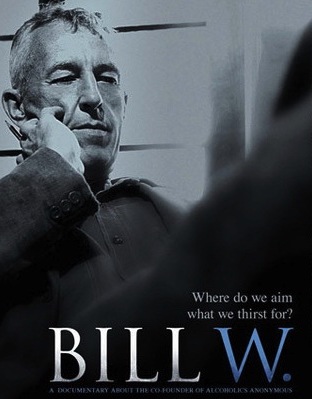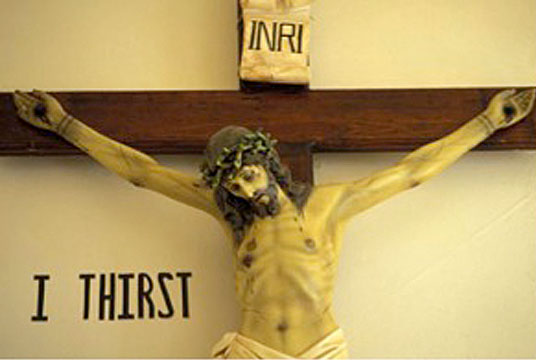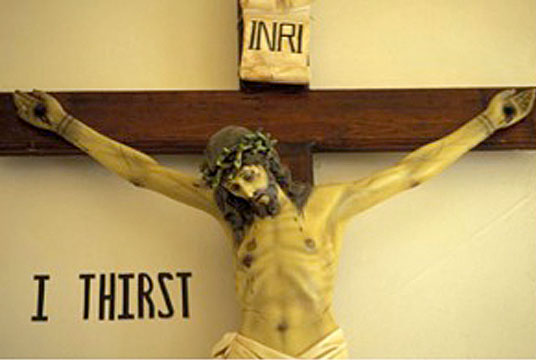At St. Thomas Episcopal Church in Menasha, Wisconsin (where I serve as deacon) we’re in the middle of a six-week series of sermons on the Beatitudes, sayings of Jesus that are found in the fifth chapter of the Gospel according to Matthew.
Jesus is addressing Jews and Samaritans and Greeks, a mixed crowd of believers and non-believers, those who think they belong and those who have been told they don’t.
He says we are “blessed” – happy or fortunate – when we are poor in spirit, when we are meek, when we mourn. He’s announcing the coming of God’s kingdom, where things are as God intends them to be.
Today we’re on the fourth Beatitude: “Blessed are those who hunger and thirst for righteousness, for they will be filled.”
Righteousness is when things are as God intends them to be.
Righteousness comes from the Greek word dikaiosune, meaning fairness or justice; my wife tells me that in German, the word for righteousness is like “richtig” – meaning that things are done correctly.
Righteousness is divine approval; what is deemed right by God.
Those who are righteous are those who are as they ought to be. Those who receive a righteous judgment are those who are treated justly, fairly, correctly – as God would have them treated.
“Blessed are those who hunger and thirst for righteousness, for they will be filled.”
Those who hunger and thirst for righteousness, then, are those who eagerly desire to see everyone treated as God would treat them.
Fr. Aran told us two weeks ago about the rabbinical way of riffing on Scripture in what is called a “remez.” I want to riff on just one word, the word thirst – righteousness may feel like too big, too abstract a concept. Thirst we can understand.
A remez is the second of the four traditional levels of interpretation of the biblical text – the historical, philosophical, homiletic, and mystical.
So here’s another philosophy – a remez – about thirst that you’ll recognize:
“Stay thirsty, my friends.”
The Most Interesting Man in the World does not really hunger or thirst for righteousness, does he? He thirsts for adventure and acclaim that set him apart from other people. In fact, with his recent well-publicized blast-off to Mars, he’s about as far apart from us as he can get.

He’s more “up in heaven” than “down here on earth.”
The flip side of that beer commercial (on the day before my third sobriety anniversary) is a very down-to-earth story about Bill W., the founder of Alcoholics Anonymous.
Frustrated by the slow growth of the AA Fellowship, and anxious about the thousands of copies of his “Big Book” Alcoholics Anonymous remaining unsold in a warehouse, he spoke to Father Ed Dowling, a Jesuit priest who appeared at his New York apartment one cold, rainy evening in 1940. As the story goes,
Soon Bill was talking about all the steps and taking his fifth step (telling the exact nature of his wrongs) with this priest who had limped in from a storm. He told Father Ed about his anger, his impatience, his mounting dissatisfactions.
“Blessed are they,” Father Ed said, “who hunger and thirst.”
Bill replied, “Is there ever to be any satisfaction?”
Father Ed said, “Never. Never any. Keep on reaching – in time your reaching will find God’s goals, hidden in your own heart.”
He reminded Bill W., “You have made a decision to turn your life and your will over to God … you are not to sit in judgment on how God or the world is proceeding. You have only to keep the channels open … it is not up to you to decide how fast or how slowly AA develops … For whether the two of us like it or not, the world is undoubtedly proceeding as it should, in God’s good time.”
Father Ed basically describes the pattern of the Christian life, what we call the way of the Cross, and Bill began to learn that night that he had to turn his thirst for success and the approval of others toward self-sacrifice instead, putting down his own ambition in favor of working his own program, one day at a time.

“We are meant to thirst. What matters is where we aim what we thirst for.”
We Christians learn about the way of the Cross, what we call “the way of life and peace,” from Jesus himself, especially from the way we see him act as the end of his life and ministry draws near.
The Beatitudes come from the beginning of his ministry, where he is drawing large crowds.
But even before that beginning, just after his baptism, Jesus had to face a trial of temptation. He is alone in the desert and the Devil appears to him.
“You look hungry; why not make these stones into bread?”
Jesus realizes that he must turn his own hunger, his concern for his own life and ministry, his power as God’s beloved, which could just make him self-sufficient, into concern for others. He must aim his hunger elsewhere, as the Word of God will teach him.
His ministry must be about feeding others (and with overflowing baskets of bread, in fact) while he eats the bread of life from God’s word which, as Paul later reminds Timothy, “is useful for training in righteousness, so that everyone who belongs to God may be proficient, equipped for every good work” (2 Tim. 3:16-17).
But at the end of his life, on the night before he died, he is once again all alone in the Garden of Gethsemane, praying “Lord, let this cup pass from me.” Perhaps in his Agony he remembers his own parable “about the need to pray always and not lose heart.”
“I’m thirsty,” he says to the Father, “but I don’t want to drink this.”
“Nevertheless, not my will but Thine be done.” The prayer he taught to his disciples – the Lord’s Prayer which we pray daily in the church, the Lord’s Prayer that many AA meetings close with – rises to his own lips: “Thy will be done.”
Jesus must aim his eagerness for the Kingdom of God, finally, away from all success, away from the crowds, away from his closest friends, and toward the one final act in the drama of redemption which only he can perform.
He gives up his freedom. He is bound and arrested, tortured and mocked, beaten and finally crucified as though he were a murderer or a thief. He endures injustice and unfairness and what is not right for the sake of the whole world.
As he hangs from the cross, Jesus says with nearly his last breath, “I thirst.”

He aims what he thirsts for at the heart of the Father, and “earth and heaven are joined, and we are reconciled to God” (BCP 287).
+ + + + +
“Blessed are those who hunger and thirst for righteousness, for they will be filled.”
Being filled in the sense that Bill W.’s story and more importantly, the example of Jesus, suggests is less about the achievement and more about the process.
The fellowship is growing too slowly for the Wall Street money man’s tastes, but it’s not about him. He must work the Steps himself and stay humble.
The Devil is persuasive to a hungry man in the desert, but he resists the temptation to use his newfound power for himself only.
The cup is bitter, like “sour grapes that set one’s teeth on edge,” like sour wine mixed with gall, but the thirsty man drinks it so that God’s will for the whole world will be fulfilled.
Over time, and with constant practice, as we do our best to set aside our ambitions and focus on our own way of the Cross – as we try daily simply to carry out our ministries fully – we will find that our reaching and God’s goals have become one.
“It’s not up to you to decide … We are meant to thirst. What matters is where we aim what we thirst for.”
Righteousness will come about not because we aim to “save the world” – which Christ Jesus has already done anyway “by his one oblation of himself once offered, a full, perfect, and sufficient sacrifice, oblation, and satisfaction, for the sins of the whole world” (BCP 334) – but because we aim what we thirst for, our ambitions and desires, at what we can do for the sake of others today.
So, stay thirsty, my friends.
Amen.

